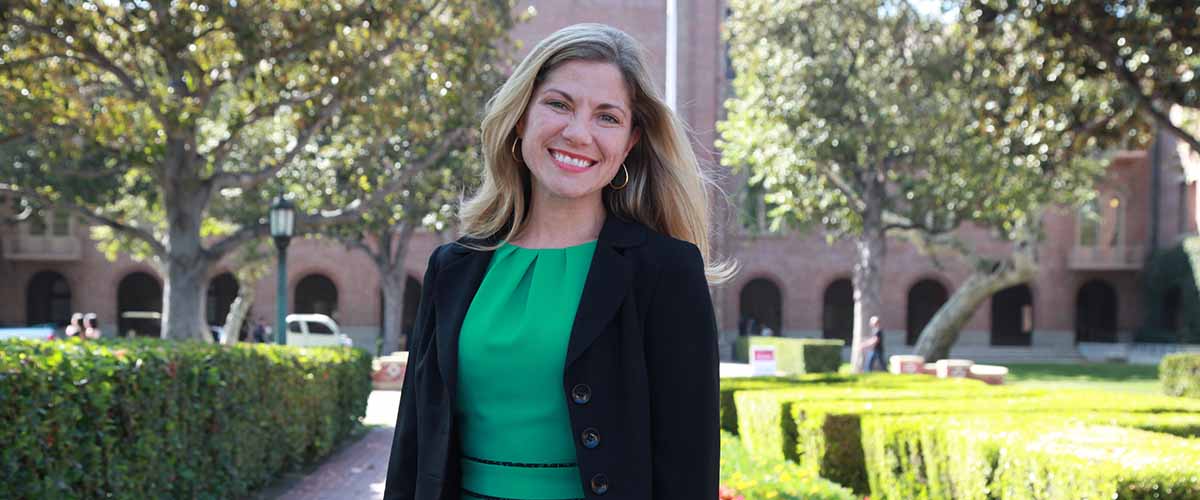
To improve equity in STEM, new project aims to create a community of changemakers
A grant from the National Science Foundation will enable faculty and administrators to bring holistic graduate admissions practices to six California universities.
Read a few graduate school mission statements, and you’ll find the words “equity” and “diversity” pop up a lot. In fact, for many universities, equity and diversity have been explicit institutional goals for decades. Yet many graduate education programs still enroll relatively few students from underrepresented minority groups, and in STEM fields, the percentages of these groups earning advanced degrees is especially low.
That is what a new project at the USC Pullias Center for Higher Education aims to change—on a large scale. Julie Posselt, assistant professor of higher education in the USC Rossier School of Education and faculty member at the Pullias Center, was recently awarded a $499,947 grant from the National Science Foundation to pilot and test an effort to empower faculty advocates to revamp the graduate admissions process and graduate education culture as a whole.
“This grant has the potential to bring broad, sustainable improvements in how students are recruited, admitted, and mentored in STEM PhD programs,” Posselt said. “At the moment, many standard practices and assumptions in graduate education normalize racial and gender inequalities. But there are also openings for change and people who are interested in bringing it about. We’ll work thoughtfully with the culture and current practices to create a community of faculty advocates who continue the work after the grant is done.”
Posselt’s previous research on graduate admissions programs found that institutions tend to overrely on high GRE scores and high grades from elite universities when selecting PhD students—a practice that has the effect of unfairly penalizing many worthy would-be students from minoritized backgrounds. To support graduate departments to shift their practices, Posselt as principal investigator, along with co-principal investigator Casey Miller at Rochester Institute of Technology, received funding from two previous National Science Foundation grants to develop and deliver professional development workshops on holistic admissions and recruitment practices to seven STEM PhD programs.
This new grant allows Posselt and Miller to greatly expand the reach of these successful workshops by building the California Consortium for Inclusive Doctoral Education (C-CIDE). Instead of changing the culture at just one science department at a time, C-CIDE will instead train a community of faculty and administrators from six major California universities—who will then return to their individual institutions and scale up the efforts with their colleagues.
“The goal of the project is to pilot and evaluate a scalable, sustainable networked improvement community focused on broadening the participation of underrepresented groups in graduate education,” Posselt said. “Our vision is to harness the desire to reduce inequalities by building faculty capacity—their knowledge and skills—to select and educate students more inclusively.”
The six universities include five University of California institutions—at Berkeley, Davis, Irvine, Los Angeles, and Santa Barbara—as well as the University of Southern California. Kelly Rosinger, assistant professor at Pennsylvania State University, will serve as the external evaluator; Theresa Hernandez, a research assistant at the Pullias Center and a PhD candidate at USC Rossier, will support Posselt’s work.
Posselt’s book, Inside Graduate Admissions: Merit, Diversity, and Faculty Gatekeeping (Harvard University Press, 2016), was the first major study of faculty decision making in graduate admissions and was named a Choice Outstanding Academic Title. Her current research, funded by three grants from the National Science Foundation, examines the roles of faculty practice and disciplinary cultures in creating barriers to and resources for equity in graduate education. Earlier this year, Posselt was named project advisor and assessment lead for a team of researchers from USC, UC Davis and UCLA that received a $1.2 million grant from the Andrew W. Mellon Foundation for a project to increase equity in graduate admissions.
____
This research is funded by National Science Foundation Innovations in Graduate Education award (grant #DGE-1807047). Posselt’s previous research in graduate admissions was also funded by NSF awards (grant #1633275 and #1649297).